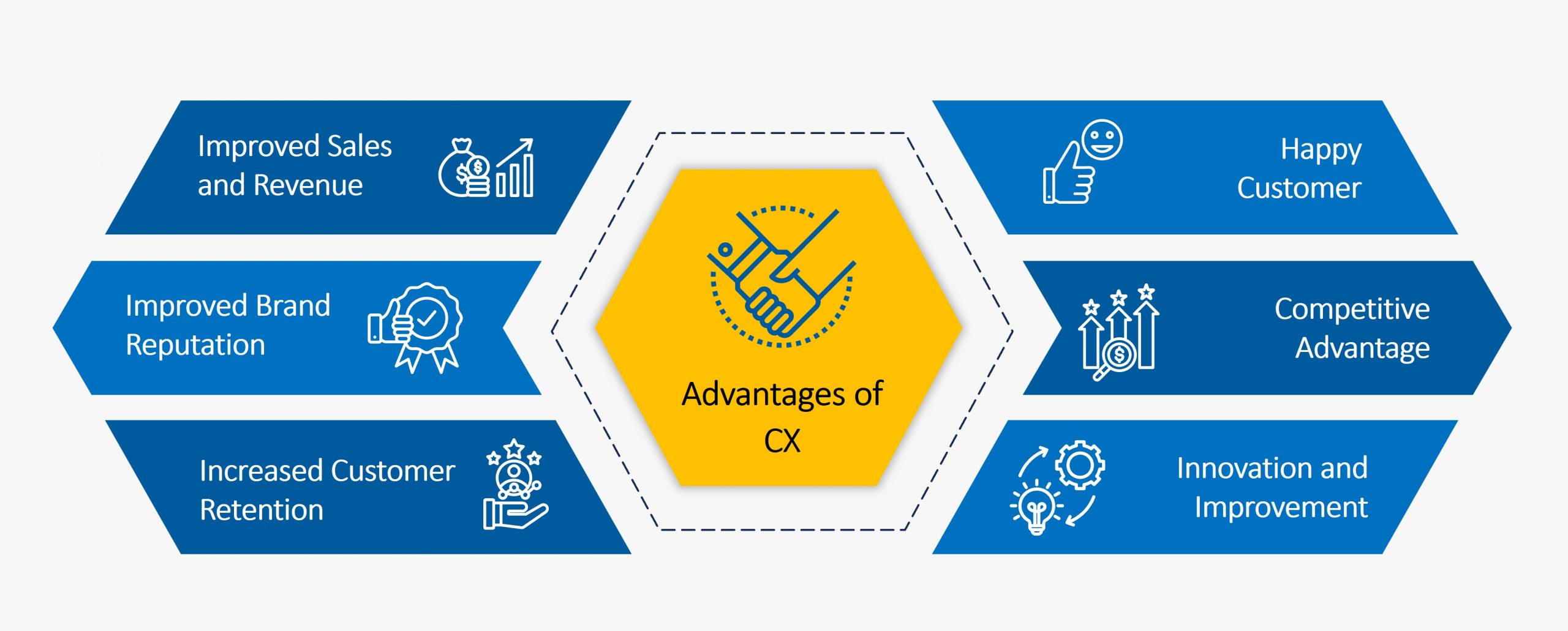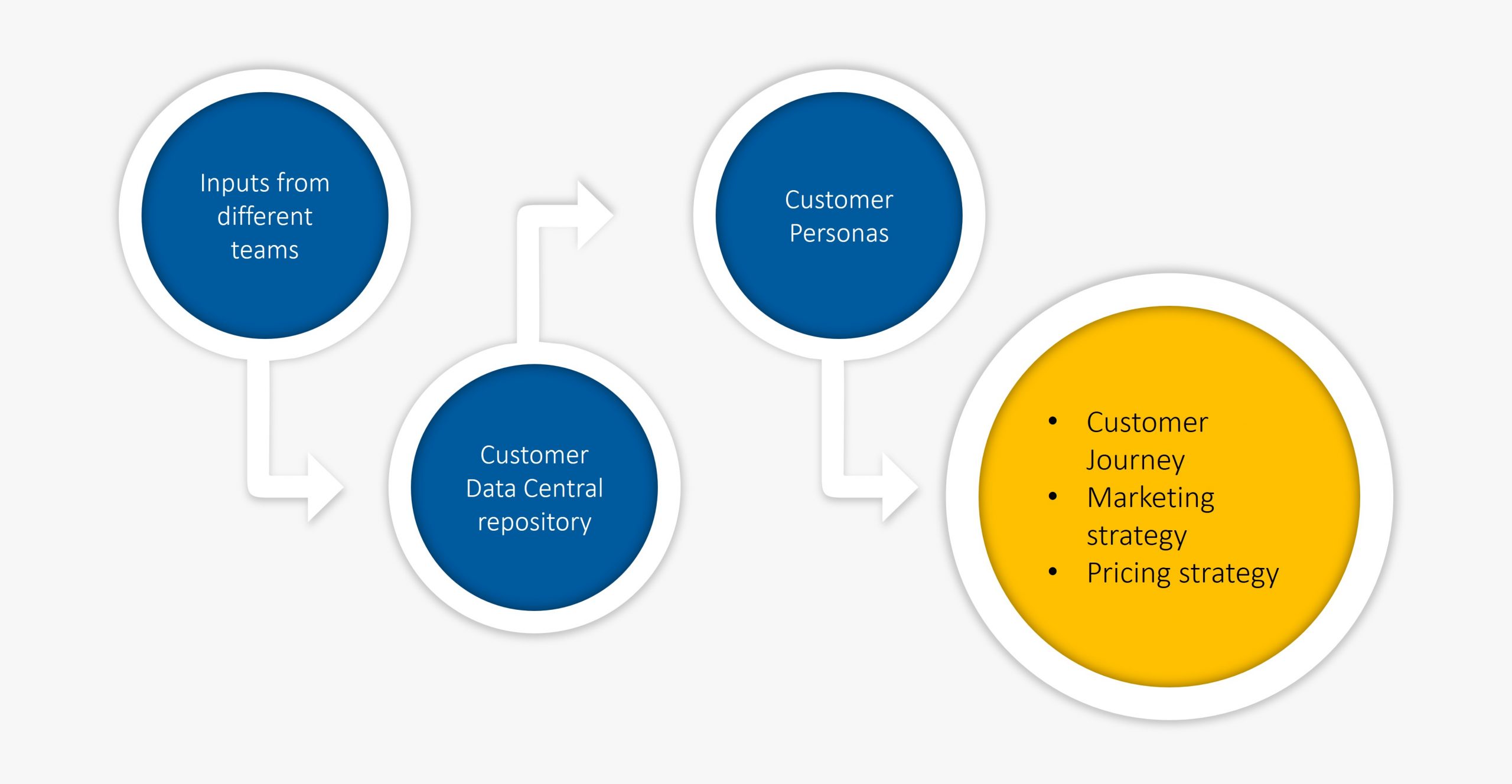Revolutionizing CX: The advanced guide for digitally transformed Customer Engagement in Industrial Manufacturing
Customer experience (CX) is the aggregation of all customer interactions and emotions with a brand, spanning from the initial contact to post-purchase engagement. This provides quality products and services and creates value, trust, and loyalty for the customer. While CX has long been a focal point for B2C businesses, the industrial manufacturing diaspora, especially B2B, has often overlooked it. Their primary emphasis was on product specifications, quality, and pricing. However, today’s customer engagement demands a resolute focus on the additional dimensions. Customers are expecting proactive, personalized sales and support coupled with seamless digital experiences. The key solution to fill this void is CX, which has emerged as a robust differentiator in today’s increasingly commoditized industrial manufacturing market.

Figure 1: Advantages of CX
The current state: Identifying the gap
According to a report by Salesforce, only 27% of industrial customers claim to be entirely content with their existing suppliers, while 57% admit of considering potential service switch within the next year.[1] Concurrently, a McKinsey study reveals that 60% of B2B customers deem online purchasing more practical than traditional channels, and 62% favor online reordering. Yet merely 13% of industrial OEMs (Original Equipment Manufacturers) extend digital solutions, and a mere 10% offer online self-service tools for placing reorders. The statistics from the study suggest that industrial suppliers have failed to address their customers’ changing needs and preferences, ultimately putting their customer loyalty and retention at risk.[2]
Challenges faced by manufacturers: Barriers to superior CX
- Low digital maturity: Industrial manufacturers have been relatively slow in adopting digital technologies and tools that can enhance CX, like e-commerce platforms, mobile apps, chatbots, analytics, Artificial Intelligence (AI), and the Internet of Things (IoT). This gap impairs their ability to track and respond to customer queries as well as provide real-time updates and personalized support.
- Product-centric focus: Many manufacturers remain product-centric or account-centric—selling features and functions rather than understanding customer needs and expectations. They lack a customer-centric approach/culture, clear CX strategy, and alignment across their business functions.
- Siloed and fragmented processes: Complex and legacy processes within manufacturing companies impede collaboration and integration across departments, geographies, and channels. This results in inconsistent and inefficient customer interactions, as well as data quality issues.
The opportunity: Enhancing business through CX
To overcome these challenges and enhance customer experience in manufacturing, manufacturers must embrace a holistic and customer-centric approach. Given that no two manufacturing companies are identical, they need to create a personalized journey that caters to the needs and preferences of their customers. Below are key levers for manufacturers to create a holistic strategy and improve customer experience:
- “Know your customer” needs and expectations
Most manufacturers lack the insight of their customers because:
- They don’t have direct customers, and interaction is through external dealers.
- Siloed sales strategy and database for different geographies or locations
- There is no database to capture all the customer data. For example, the sales team has data that is different from that of the engineering or service team.
To understand customers, manufacturers need to create a central, transparent, and accessible database for all the organization’s functions and generate “3600 view” of customer data and insights. Industrial manufacturers can further use the collected data to create customer personas as per their location, requirements, order size, sales touchpoints, etc.
Once a persona is created, manufacturers can create seamless and personalized customer journeys, product pricing, and marketing strategies.

Figure 2: Create personalized offering for customers
- Implement digital technologies and tools:
Manufacturers need to leverage digital technologies and tools that can enhance CX by making it more convenient, personalized, relevant, and engaging for customers. A Gartner forecast predicted that by 2025, a staggering 80% of B2B sales interactions between suppliers and buyers will take place via digital channels, signaling a substantial shift towards online communication and commerce in the business-to-business landscape[3]. Some of the key technologies and tools include:
- Multi-experience: Manufacturers need to provide multiple channels for customers to connect as per their preference, such as phone, chat, WhatsApp, Facebook Messenger, etc. They also should ensure that the digital experience of customers across channels should be seamless and delightful.
- E-commerce platforms: Customers should have access to online ordering capabilities that are easy to use, secure, and integrated with their back-end systems.
- Mobile apps: They allow customers to access information, place orders, track shipments, request service, etc., from anywhere at any time.
- Chatbots, voice bots, and IVR: Manufacturers
- need to employ bots to provide instant answers to common customer queries, such as product specifications, pricing, availability, etc. Natural language processing (NLP) and Machine Learning (ML) should power chatbots to make them more intelligent and conversational.
- Internet of Things (IoT): Manufacturers need to use IoT to connect their products and services with customers and data and enhance CX through remote monitoring, predictive maintenance, performance optimization, etc.
- Data analytics powered by AI/ML: Companies need to gather customer insight from all those channels and then use AI/ML-powered analytics to generate insights and recommendations for CX improvement. This helps to identify customer preferences, behavior, etc., to create user personas and provide personalized services.
- Integration of tools: All the CX tools should be integrated into each other to feed and use data from each other. For example, persona information should be fed into loyalty applications to generate personalized offers and pricing, to be further shown to customers on websites or mobile apps.
- Empower and engage employees
Despite digital advancements, customers often prefer human interactions. According to a report by PWC , a research company, 75% of individuals express a preference for interacting with a real person over utilizing technology, suggesting that human connection and personal touch remain valued aspects of customer engagement and service delivery.[4] Manufacturers should enhance employee experience so that they may deliver superior CX, especially sales personnel who interact directly with customers. Equipping them with digital tools, providing training, and fostering a customer-centric mindset can significantly impact CX. They should be motivated and incentivized, as well as rewarded and recognized for their CX achievements.
Customer Experience to be Manufacturers Big Bets
CX serves as a potent competitive differentiator for industrial manufacturers, setting them apart in a crowded market. The transition from a product-centric to a customer-centric organization should be a comprehensive and gradual one. With a sound strategy, unwavering focus, and meticulous implementation, manufacturers can deliver exceptional experiences and attain unparalleled business success.
References
[1] Salesforce | State of the Connected Customer Report
https://www.salesforce.com/in/resources/research-reports/state-of-the-connected-customer/
[2] McKinsey | How to boost growth in industrial services: Better customer experience | Article
[4] pwc | Experience is everything. Get it right.
Latest Blogs
A closer look at Kimi K2 Thinking, an open agentic model that pushes autonomy, security, and…
We live in an era where data drives every strategic shift, fuels every decision, and informs…
The Evolution of Third-Party Risk: When Trust Meets Technology Not long ago, third-party risk…
Today, media and entertainment are changing quickly. The combination of artificial intelligence,…




